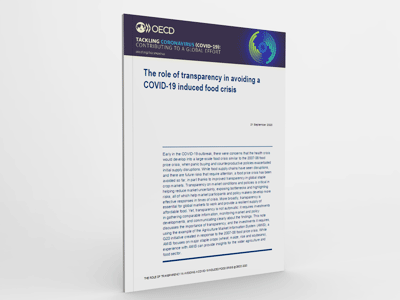Food security and Nutrition
Better agro-food policies are crucial to improving global food security
Ending hunger and malnutrition is among the greatest challenges humanity faces. A person is considered “food secure” when they have the physical, social and economic access to sufficient, safe and nutritious food that meets their dietary needs and food preferences for an active and healthy life (as defined by the United Nations Committee on World Food Security). Urgent action is needed to address global food security as recognised in the UN Sustainable Development Goals (SDGs). SDG2 sets targets to end hunger, achieve food security, improve nutrition, and promote sustainable agriculture by 2030. These are critical challenges for the world requiring international cooperation and policy reform.
While progress had been made over the years to improve food security, the pandemic has reversed many of these gains which were already uneven across countries and regions. According to estimates by the UN Food and Agriculture Organization, COVID-19 has led to a sharp increase in undernourishment with between 720 and 811 million people in the world facing hunger in 2020, 118 million more people in 2020 than in 2019. Despite average global food availability per person growing by 4% to 2030, achieving SDG 2 on zero hunger will be challenging. Disparate growth in food availability between regions will see consumers in middle-income countries increase their food intake most significantly while diets in low-income countries will remain largely unchanged. This has serious implications for undernourished and severely food insecure populations who are most in need. The impact of climate change and the rise in extreme weather conditions will further impact food security, as crops production has to shift to new regions, creating short-term fluctuations in food availability. Trade will remain essential for food security in food-importing countries and for rural livelihoods in food-exporting countries.
But governments can act to increase food security, and in the face of these challenges, policy choices matter.
Food security is not only about the availability of food, but also about better access to food
The root cause of most food insecurity today is poverty and even people in OECD countries face food insecurity, with Indigenous Peoples being particularly vulnerable.
Short-term interventions were important to address the immediate needs of the most vulnerable (emergency food aid, for example) in OECD countries during the COVID-19 pandemic and in some instances digital technologies were used.
Foodbanks run by non-governmental organisations provide emergency food assistance, sometimes using food recovered as part of food waste policies; but policy efforts must focus on sustainable solutions to build medium- and long-term resilience to food supply shocks for those people currently afflicted by chronic hunger and food insecurity. Work is currently underway on the operation of foodbanks in OECD countries. Understanding the role that socio-economic and demographic factors play in determining household food purchases and consumption is critical too. Socio-economically disadvantaged groups tend to consume less nutritious food, leading to suboptimal health outcomes, including obesity. Contributing factors include low levels of income and education; time-poor single parent households; and the prevalence and accessibility of fast food restaurants.
Policy choices matter
Increasing the incomes of the poor and tackling development challenges for countries are critical elements for achieving global food security. But policies may also be needed to ensure that higher incomes translate into improved nutrition, including polices focused on health, education, social protection and infrastructure. OECD has a four track set of recommendations for policies for encouraging healthier food choices. Evaluating the effectiveness of policies and in particular the needs of socio-economic and demographic groups is hampered by inadequate and irregular food data collection, including on the prevalence of food insecurity.
Agricultural policies are often maintained with the stated aim of increasing food production and thereby food security. Market interventions in the agriculture sector (such as subsidies or export restrictions) often result in higher prices for staple foods, with a negative impact on the food security of poor households (which can include poor farmers who may be net consumers of such crops). Support policies not only fail to achieve their aim, they can also divert public resources away from actions that could tangibly contribute to improved food security. These includes efforts to create a stronger enabling environment for agricultural productivity or to develop agricultural innovation systems to boost productivity growth. Other investments that support improved food production and availability include rural infrastructure and storage facilities, and appropriate training and advisory services would be beneficial for food security. Strong and effective systems to build resilience and risk management capacity in agriculture production are also critical in helping build food security at the national and global levels.
More efforts are needed to design coherent food systems policies to address food insecurity to reach SDG2 by 2030.
Latest update
The role of transparency in avoiding a COVID-19 induced food crisis
Early in the COVID-19 outbreak, there were concerns that the health crisis would develop into a large-scale food crisis similar to the 2007-08 food price crisis, when panic buying and counterproductive policies exacerbated initial supply disruptions. While food supply chains have seen disruptions, and there are future risks that require attention, a food price crisis has been avoided so far, in part thanks to improved transparency in global staple crop markets.
Policy brief
Food security publications
Access all OECD publications on food security on the OECD iLibrary.
Agriculture and fisheries publications
All of our food, agriculture and fisheries research and analysis is available to read online for free on the OECD iLibrary.
Sign up for our newsletter
Sign-up to our agriculture newsletter to receive periodic e-mail updates on new publications, videos and analysis.
Contact us with your questions
If you have questions about OECD research and analysis on agriculture, please feel free to contact us directly.
